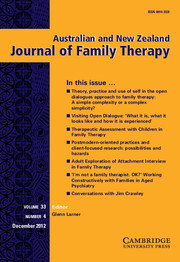Crossref Citations
This article has been cited by the following publications. This list is generated based on data provided by
Crossref.
Rhema, Susan Heffner
Gray, Amber
Verbillis-Kolp, Sasha
Farmer, Beth
and
Hollifield, Michael
2014.
Refugee Health Care.
p.
163.
Apostolidou, Zoe
2015.
Politicised notions of professional identity and psychosocial practice among practitioners working with asylum seekers and refugees.
British Journal of Guidance & Counselling,
Vol. 43,
Issue. 4,
p.
492.
Apostolidou, Zoe
2016.
The notion of professional identity among practitioners working with asylum seekers. A discursive analysis of practitioners’ experience of clinical supervision and working context in work with asylum seekers.
European Journal of Psychotherapy & Counselling,
Vol. 18,
Issue. 1,
p.
4.
Karageorge, Aspasia
Rhodes, Paul
Gray, Rebecca
and
Papadopoulos, Renos
2017.
Refugee and staff experiences of psychotherapeutic services.
Intervention,
Vol. 15,
Issue. 1,
p.
51.
Mengesha, Zelalem B.
Perz, Janette
Dune, Tinashe
and
Ussher, Jane
2018.
Talking about sexual and reproductive health through interpreters: The experiences of health care professionals consulting refugee and migrant women.
Sexual & Reproductive Healthcare,
Vol. 16,
Issue. ,
p.
199.
Dubus, Nicole
2018.
Integration or Building Resilience: What Should the Goal Be in Refugee Resettlement?.
Journal of Immigrant & Refugee Studies,
Vol. 16,
Issue. 4,
p.
413.
Killian, Kyle D
and
Agathangelou, Anna M
2018.
The Wake of War: Relationships Among Gender, Trauma, Resources, and Traumatic Stress in Refugee Families.
Journal of Feminist Family Therapy,
Vol. 30,
Issue. 3,
p.
129.
Butler, Rose
2019.
Class, Culture and Belonging in Rural Childhoods.
Vol. 7,
Issue. ,
p.
85.
Amorin‐Woods, Deisy
2020.
Habla Mi Idioma? An Exploratory Review of Working Systemically with People from Diverse Cultures: An Australian Perspective.
Australian and New Zealand Journal of Family Therapy,
Vol. 41,
Issue. 1,
p.
42.
Rhema, Susan Heffner
Verbillis-Kolp, Sasha
Gray, Amber
Farmer, Beth
and
Hollifield, Michael
2020.
Refugee Health Care.
p.
215.
Wei, Karen
Chopra, Prem
Strehlow, Susie
Stow, Mardi
Kaplan, Ida
Szwarc, Josef
and
Minas, Harry
2021.
The capacity-building role of community liaison workers with refugee communities in Victoria, Australia.
International Journal of Mental Health Systems,
Vol. 15,
Issue. 1,
Duden, Gesa Solveig
and
Martins-Borges, Lucienne
2021.
Psychotherapy with refugees—Supportive and hindering elements.
Psychotherapy Research,
Vol. 31,
Issue. 3,
p.
402.
Delizée, Anne
and
Michaux, Christine
2022.
The mental health interpreter’s relational agency and therapeutic alliance.
The Translator,
Vol. 28,
Issue. 2,
p.
215.
Duden, Gesa Solveig
and
Martins-Borges, Lucienne
2022.
Psychologists’ perspectives on providing psychological care for refugees in Brazil.
Counselling Psychology Quarterly,
Vol. 35,
Issue. 3,
p.
605.
Due, Clemence
and
Currie, Emma
2022.
Practitioner competencies for working with refugee children and young people: A scoping review.
Transcultural Psychiatry,
Vol. 59,
Issue. 2,
p.
116.
Tessitore, Francesca
Del Vecchio, Francesca
Cozzolino, Mauro
and
Margherita, Giorgia
2023.
“Unaccompanied social workers, unaccompanied families”: qualitative research on Italian professionals’ feelings and emotions on working with African refugee families.
Journal of Social Work Practice,
p.
1.
Vincent, Kate
2023.
The problem of professionalism: How White social workers enact Whiteness in their work with people of refugee background.
Qualitative Social Work,
Vol. 22,
Issue. 2,
p.
217.
Vincent, Kate
2023.
Unveiling Whiteness within organisations working with people of refugee background.
The British Journal of Social Work,
Vol. 53,
Issue. 4,
p.
2079.
Davoren, Niamh
McEleney, Alice
Corcoran, Santhi
Tierney, Phelim
and
Fortune, Dónal G.
2024.
Refugees and asylum seekers who have experienced trauma: Thematic synthesis of therapeutic boundary considerations.
Clinical Psychology & Psychotherapy,
Vol. 31,
Issue. 1,




